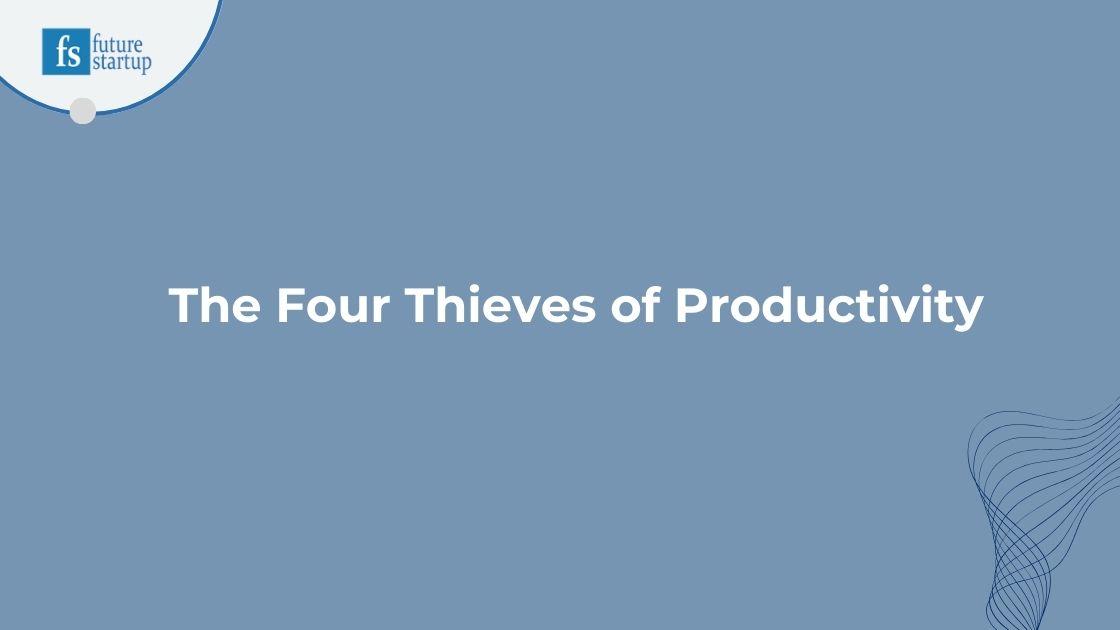
In his excellent book The One Thing, Gary Kellers offers an effective framework for managing and improving our productivity. Kellers calls this framework “four thieves of productivity”.
He used the four thieves of productivity framework to highlight common obstacles that can hinder our ability to stay productive and focused on our most important tasks. These thieves represent challenges that many people face when trying to achieve their goals and prioritize their work effectively. These four thieves are:
One key idea is that while we often look for strategies tools and solutions to improve our productivity, sometimes, the real challenge can lie in our inability to get rid of some of our habits and tools. Sometimes subtraction can be far more effective a strategy to improve our productivity than adding more things.
Let’s take a deeper look into each of these four thieves and a few strategies to overcome them.
This thief represents the difficulty many individuals have in saying no to distractions, additional commitments, or tasks that are not aligned with their most important goals.
When you say yes to too many things, you can spread yourself too thin, leading to reduced focus on your core tasks. Learning to say no to non-essential activities or requests is crucial for focusing on what truly matters.
The cost of our inability to say no is many. Let’s take a deeper look into the inability to say no concept and what it means for our productivity and well-being:
This relates to the fear of losing control or having things become chaotic if you don't try to manage everything at once.
Some people believe that they must have complete order and control over all aspects of their life and work. However, this quest for perfection can lead to indecision and paralysis, making it difficult to prioritize and act on your most important tasks.
Embracing a certain level of chaos and unpredictability can be necessary for progress.
The fear of chaos can be understood as the fear of letting go of control or orderliness in various aspects of one's life, including work, personal life, and daily routines. Here's an explanation of what fear of chaos might look like in practice and how we may overcome it:
To overcome the fear of chaos, focus on your most important tasks or goals, and take action, even if it means embracing some level of uncertainty and chaos along the way.
By doing so, you can make meaningful progress toward your goals and achieve extraordinary results without being paralyzed by the fear of chaos or the need for absolute control.
This thief underscores the importance of taking care of your physical well-being. Neglecting your health can sap your energy and cognitive abilities, making it harder to concentrate and be productive.
Good health habits, such as getting enough sleep, maintaining a balanced diet, and engaging in regular physical activity, are essential for sustaining the energy and focus needed to accomplish your tasks. The manifestation of poor health habits and their costs may include:
The Highly Productive Person’s Daily Energy Plan: Keller offers the following strategies to overcome poor health habits and maintain high energy every day:
1. Meditate and pray for spiritual energy
2. Eat right, exercise, and sleep sufficiently for physical energy
3. Hug, kiss, and laugh with loved ones for emotional energy
4. Set goals, plan, and calendar for mental energy
5. Time block your most important thing for business energy
This highlights the significance of your physical and social environment in influencing your productivity. Your physical environment includes your workspace, home, and surroundings. If your physical environment is cluttered, disorganized, or filled with distractions, it can hinder your ability to concentrate on your most important tasks. A cluttered environment can create mental clutter and make it difficult to prioritize and stay focused.
Additionally, your social environment consists of the people you interact with regularly, such as family, friends, colleagues, and acquaintances. If the people in your social environment are unsupportive, negative, or constantly interrupting your efforts to work on your goals, it can be challenging to maintain focus and momentum. Surrounding yourself with individuals who understand and support your goals is crucial for success.
To create an environment that supports your goals and minimizes distractions you can use some of the following strategies —
By addressing and optimizing your environment to align with your goals, you can create a more conducive setting for achieving your goal and maximizing your productivity and success. Your environment plays a crucial role in shaping your habits and behaviors, so making it work in your favor is essential for achieving extraordinary results.
The One Thing is a superb read in its entirety. You can read my review of the book here.
